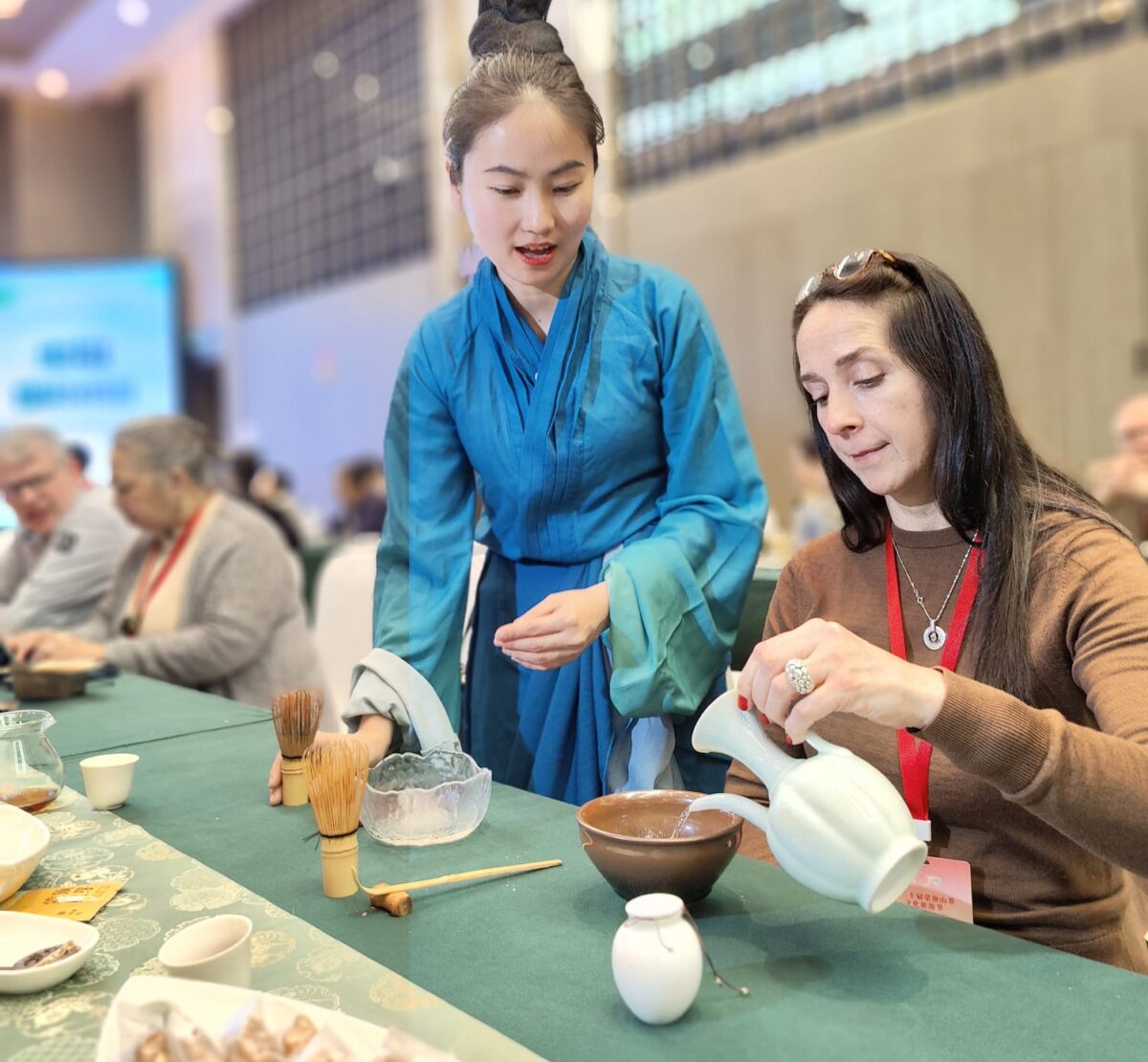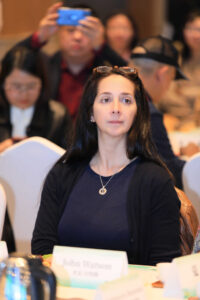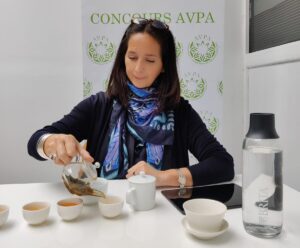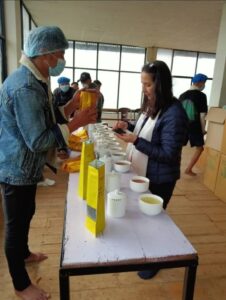
Maria Kockmann was born and raised in Montevideo, Uruguay. Her roots are French and broadly European, blending French Basque and Spanish from Asturias on her father’s side, with Italian and English on her mother’s side. She attended the Lycée Français, like most children of European families who emigrated to South America in the 19th century. Growing up under military dictatorship, her father, a musician and conductor, was arrested, and family members were forced into exile. Amidst this climate, which she claims gave her a clarity about life, one element grounded and anchored her: tea. As a child, she refused milk and drank teas and herbals from a young age. Tea is also tied to her grandmother, a seamstress who created wonders for the children’s department of London-Paris, Montevideo’s chic department store. Maria would join her in her small workshop after school, where a large English porcelain teapot always awaited near the sewing machine. In these moments, time seemed to stand still.
But here she is in Bordeaux, first as a student, then at the head of the digital communications agency she set up, working on prestigious projects. And tea is here too. She evolved and discovered Chinese tea, the gaiwan, and then Japanese tea and the chanoyu, thanks to the Japan House in Bordeaux. Tea, initially a hobby, allowed her to share and take time for herself. In the bustling internet bubble of the 2000s, she thrived among fellow pioneers, feeling as though she was changing the world. Until one day, during a training session, she realized her profession was shifting towards a form of commercialism with which she was profoundly uncomfortable. At 38, she decided to close her agency, leave Bordeaux, and return to South America. This secret garden linked to her grandmother would now occupy her life.

Her first tea house project in Argentina failed. Kockmann says she could not find the right people to accompany her in a country she describes as surreal and perpetually on the brink of crisis. Despite this failure and the setbacks it caused, her vocation solidified. Over time, she visited tea plantations and trained as a sommelier in Argentina, one of the first countries to offer such training alongside the UK. Returning to Europe, she joined a South African tea house, where she discovered rooibos and African tea. She describes her first sourcing mission in South Africa as “a revelation because I discovered an incredible environment and a plant that is a true phoenix; it was a bit of my own rebirth and I identified with that.” Gradually, through various missions, her network in the tea world expanded.
In 2019, she settled in Brussels as a consultant tea sommelier for a renowned tea house in northern France. Her expertise includes selection, sourcing, creating ranges, product development, and organic certification processes. She also serves on the technical jury for the AVPA’s “Thés du Monde” competition. Passionate about connecting people, she conceived the idea of a “Petite confrerie du thé” (“Little Tea Brotherhood”) which evolved into co-founding The Tea Circle Brussels.
Maria Kockmann embodies a deep-rooted connection to tea, an ability to reinvent herself, driven by insatiable curiosity, an open-minded spirit free from dogmatism, and a desire to create connections and meeting places. Her holistic conception of tea considers not only the senses but also the body and mind. Let’s meet her!
Anne-Frédérique: Could you tell us a few words about The Tea Circle?
Maria: I enjoy connecting people, which I believe has always been in my DNA. As a child, I was taught to volunteer and get involved, so my mother and I would go to a Protestant church because she was of English origin. Paradoxically, I have no religious education, but we would, for instance, bring meals to the homeless and those in need. This gave me the desire, when I arrived in Brussels knowing no one, to create a group I named “La petite confrerie du thé*.” It started informally with clients or during workshops, where I’d ask, “Would you like to share a tea?” There was a beautiful park near the shop. That’s how I began connecting people who didn’t know each other, even though they were from Brussels and frequented the same places but had never spoken. I believe this is also the magic of tea, bringing together totally different people at the same table. The Tea Circle was born from this. Later, through my work at Unami and “La petite confrérie du thé” (the little brotherhood of tea), I met Cinzia Merlin, who works at the European Commission, not in tea, but who trained as a tea sommelier at the UK Tea Academy. She always wanted to do something in tea. At the same time, I recruited Carole Duflos at Unami, who had worked at Palais des Thés. Together, we founded this place to “meet” tea and also bring people together, with encounters with producers and project leaders, outside a traditional tea house. We offer meetings and training sessions. Cinzia completed the Global Japanese Tea Association’s training, went to Japan, and became a Tea Catalyst, allowing her to teach their courses. We’ve started developing them. We also have experiences like the ‘gongfuthèque’ (the gongfu library). I’m from a time when we went to the library. I love going there to work and write; it revitalizes me. The ‘gongfuthèque’ is a place where we practice with others, often leading to little revelations.
Anne: Are there teas (styles of tea) that resonate with you? Are there teas you describe and appreciate better, even if they aren’t your favorites?
Maria: Yes, inevitably, when you have the chance to know producers or tea actors who show you behind the scenes, you see the leaves you drink differently. There’s all this background, not just purely technical quality data, but also the human connection that enlightens the experience. So yes, I’d say all the teas from places I’ve visited and where I’ve developed personal ties with the producers. But I’m also very curious and always seeking new experiences. I wouldn’t say I have favorite teas, but there have been periods in my life where I was really interested in certain teas. Today, I feel I’m at the best moment of my life, the most in harmony with myself and others, and this coherence is reflected in the teas I enjoy. I can really taste everything with a more open and benevolent perspective than in other times of my life, where I was deep into Orientalism, focusing solely on one way of preparing tea, or into technical sommelier aspects. All this has nourished me and led to a more holistic approach to tea, where the key word for me is consciousness.
Anne-Frédérique: Can you elaborate on this holistic approach?
Maria: Bringing consciousness to tasting, not just in the sensory experience of the mouth or intellect, but also in the body. Sometimes these approaches face each other: the very Western sommelier side, especially French, and the very experiential Chinese approach. I’ve managed to appropriate both and have a complete, holistic experience. Practice leads to automatisms in gestures and mindset, potentially leading to introspection or meditation. For me, tea is a medium to ground myself in life. That’s my definition of tea. I’ve started small sessions guiding people through this journey. It’s not just a moment to meditate and drink tea, but an entryway. Often, I choose a text, as I love reading, especially Buddhist and Taoist texts that align with these philosophies. There’s one I really like (by Thich Nhat Hanh) about rain, a little leaf at the bottom of a jar and a little child trying to catch it, but his arm is too short, so he tries to catch it with a stick, but it spins, so he drops it. Then he comes back and sees that the leaf is at the top. The water has done its job and the leaf has finally emerged. I think that tea and the practice of tea are often like that: we go looking for things that we don’t necessarily understand, and then, at a given moment, we have this revelation of sorts. In Buddhism, we talk about the consciousness of the deep, so it’s all our experience, all the information, and at some point, we’ll have this clairvoyance, which for me, is often linked to tea. Infusing life means infusing things, infusing questions. Life always gives us answers, and for me, through tea too, in those more meditative moments when I’m really aware, when I simply give the leaf the opportunity to rise again. So these are moments of humility too, because in the end you can’t control anything. We know, but we could always know a lot more. I think we’re all eternal apprentices, even in areas where we feel we’ve achieved a certain expertise. And every time we take another tack, we zoom in and discover a new world. Luckily, tea makes these moments possible, and the little leaf rises again.

Anne-Frédérique: Were there any teas that caused you particular problems, with which you didn’t have an affinity, and which you eventually got accustomed to?
Maria: Yes, as I was saying, there were times when I was very much into a Japanese approach, for example, or a very Chinese one, and that was all that mattered. But the fact that I also joined this tea house (note: Unami), that I discovered different worlds when I went to Sri Lanka, India, even Argentina where I did my training, and then, afterwards, when I discovered other countries too, Georgia, Turkey, African countries where things are totally different, enabled me to see that each tea, each origin has its own characteristics and that you have to take the time to tame it and above all not compare them. Personally, I always compare what’s comparable and that’s why I like the AVPA competition, because we’re not comparing a tea against a benchmark, which could be Chinese or a standard, but comparing what’s comparable. I would never, for example, compare a Chinese red tea with a Turkish tea. It’s like comparing things that are simply incomparable. You take them out of context. And so, yes, there have always been teas that at one time or another have caused me problems, but more because of a lack of openness and personal formatting than because of the teas themselves, in fact, and I’ve had the opportunity, the chance to evolve, to make my own way, both personally and in the tea world, so that I can revisit, encounter this tea again. It’s something I do regularly, because even if you can have a purely qualitative analysis, for me tea isn’t just that. It’s part of the sourcing process, to say whether a tea is objectively of good quality or not, whether I’m buying it, whether it’s worth so much, etc. It’s a precise context. But for me, there’s more to tea than that.
Anne-Frédérique: You keep your mind open?
Maria: Yes, and particularly for new origins. I’ve always defended the new origins of tea, because tea is a big industry, and it’s not the romantic image that some enlightened tea lovers – what I call the ‘ayatollahs of tea’ – have, particularly in France, but less so abroad. They take a very dogmatic approach, believing that only countries that produce and consume their teas are credible, and have a highly idealised vision of the tea plucker with the leaf. Picking is an extremely thankless job, it’s a farmer’s job. Are we going to see the same idea of the potato farmer? Of course not. But that’s what the majority of the tea industry is all about, farming and industry, and the majority of production is industrial tea. To deny this and say that it’s only specialty teas that count and that only teas produced in small gardens are worthwhile is to misunderstand the industry.
On the other hand, there’s been a lot of greenwashing, and now we’ve gone from the absolute obscurantism of the big companies to slightly more mainstream brands where the storytelling doesn’t necessarily reflect reality, but which has led people to say that it’s important to know where it comes from, and so on. This has changed attitudes, but for me, the key is the person who is going to embody the product, and that means the salesperson, the last link in the chain. Because we can have real treasures in our boxes, but if at the end of the day we don’t know how to convey that dimension, if we confine ourselves to saying “this is of exceptional quality” and give you all the certificates and labels possible, I think we’re missing out on the human element. So for me, the human element is always at the heart of the matter. And if it’s the human element that’s consistent with everything else, that’s even better.
Anne-Frédérique: What do you think of the highly “technical” trend that is developing among some enthusiasts?
Maria: One should not focus solely on the cultivar, the cultivation process, and such. It always amuses me when people say, “Yes, this is heated to such and such a temperature,” or ask all these questions related to preparation. Of course, these aspects are necessary, but one should not remain confined to them because, in that case, where is the pleasure? When I cook, do I really measure out 20 grams of butter when I cook something? No, at a certain point, you can trust yourself, and the same applies to the practice of tea. It’s a wonderful way to build self-confidence because we are capable of evaluating. I often do this in gong fu tea workshops; I give a deck of cards and say, “Find the middle.” Most of the time, people are accurate to within one or two cards because our brain is capable of so much. There are countless deeply personal ways we can develop to do things in a manner that suits us. As a tea house or tea vendor, of course, we must provide a basic set of tools, but I think the next step is to appropriate the product. At that point, we are no longer maintaining a very technical distance or striving for perfection; rather, the moment becomes a part of us.
Anne-Frédérique: And it’s ephemeral by definition, like a theater performance that will never be the same twice…
Maria: Exactly, and that is also what makes it wonderful. Sometimes I taste extraordinary teas without knowing exactly how I prepared them. It was fantastic, and I find myself in search of that lost cup because when I try to make these teas again, they are never quite the same for many reasons. Perhaps at that moment, I was more receptive, I had a different intention, the water quality was better, or who knows, but that is what is remarkable, especially all those moments that nourish our tea practice.

Anne-Frédérique: What advice would you give to tea enthusiasts who are looking to refine their taste and progress?
Maria: Precisely, to bring awareness and passion. When drinking and preparing tea, because often tea enthusiasts have a wealth of knowledge, but it is not connected. What is missing is consciousness; they have plenty of tea ware, many things, but have they seen? Have they felt? Have they detected differences when using one type of cup over another, with different porosity? It’s up to the individual to bring awareness to the experience, to what they are living, in order to enrich their experience with tea. So my advice would be: bring awareness, bring consciousness to what you do, from the choice of preparation objects to the dosage. I will use more leaves, I will play with the water, etc. All of this is part of the experience. Tea is an experience, a sensory experience in the broadest sense, not just what happens in the mouth, but also trying to connect our knowledge with our body. Sometimes you might have a great tea of very high quality, with many characteristics where you can perfectly discern the texture, the aromas, etc. You drink it and either you feel nothing, or on the contrary, it makes you uncomfortable. That’s why there are teas that my stomach cannot handle, because I am a body, because there is a season, because there are hormones, emotions, all of these things interact. So, bring consciousness and you will discover a new way of drinking tea. Of course, some people do not want to do this, just as they do not want to bring consciousness into their lives and prefer to stay on the surface. For me, if we stay purely in the sensory experience, we remain on the surface, and that is valid, that is valid too.
Anne-Frédérique: Finally, an event is being prepared, which will be the first of its kind in Belgium. Could you tell us a few words about the Tea Festival?
Maria: Yes, for the festival project, we have a magnificent venue, the Foyers of Flagey, the former Maison de la Radio in Ixelles, an iconic place in Brussels’ and even Belgium’s culture. We will be using the foyers, two immense spaces where we will set up booths. We also have an enclosed room where we will organize round tables. Initially, we thought of holding workshops, but I think that’s a bit reductive and it’s an opportunity to bring people together rather than having them pass one after the other. So we will organize round tables on various topics with different actors from the tea world. The idea is for each participant to have a moment of exchange, rather than it being like a fair where flyers are simply handed out. The commercial aspect is legitimate and necessary because any tea project must be viable, but we aim to elevate it. Because to me, what’s interesting is that people can tell their story. Today, we remain in the realm of images, on the surface, with few opportunities to tell who we are, why we do what we do, who is behind it. The objective is for these round tables to provide that opportunity. There will be chairs for people to sit, they will taste, discuss, and exchange ideas. We will also foster connections among exhibitors to create a sense of fellowship, to make them see themselves as actors in the tea world. This sentiment of camaraderie is what we hope to develop. That’s what we do with the Tea Circle. We welcome everyone, be they trainers, producers, or tea houses. In this spirit, the festival embodies this: you have a place, we have a community, come and tell your story, come and share tea with the public and say, “I live from what I am passionate about” and that is the most beautiful example of inspiration we can offer to all tea lovers.
The first edition of the Brussels tea festival will take place on October 5th !
Tea Market
Get More Value from Your Tea: BRU Maker One
+41794574278
Jacque's Organics
(647) 804-7263